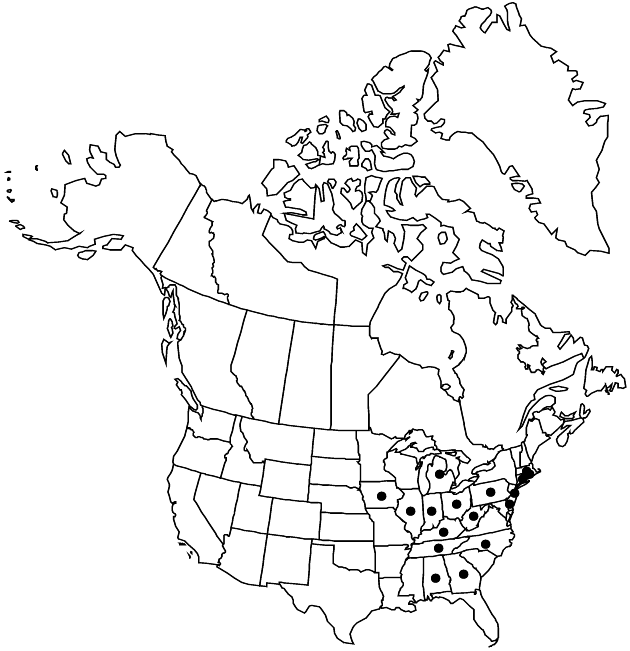Aster tataricus
Suppl. Pl., 373. 1782.
Plants 50–150(–300) cm, densely colonial; rhizomes fleshy, ± woody with age, with abundant fibrous roots. Stems 1–3+, erect, sparsely to densely (distally) strigillose. Leaves basal and cauline, very coarse, margins scabrous, apices mucronate, faces scabrous; basal usually deciduous by flowering; proximal cauline persistent, long-petiolate (petioles ± winged, bases sheathing), blades strongly 1-nerved, oblanceolate, 300–500 × (50–)60–120 mm, bases attenuate, margins undulate, recurved, coarsely serrate, teeth mucronate, apices acuminate, acute, or rounded; mid and distal subpetiolate to sessile, blades oblanceolate to lanceolate, 40–180 × 10–50 mm, bases attenuate to cuneate, sheathing, margins serrate or entire, apices acute to acuminate; distal (arrays) abruptly reduced, lanceolate, 5–10 mm, apices acute to acuminate. Heads 14–50+ in corymbiform arrays, branches ascending. Involucres campanulate, (6.5–)7–10(–12) mm. Phyllaries in 3–4 series, ovate to lanceolate (outer) or linear-lanceolate to linear (inner), green to base along midnerves or outer sometimes largely foliaceous, apices acute (outer) to long-acuminate (inner), abaxial faces glabrous or sparsely strigillose. Rays 14–30; laminae pale lavender or purple, 10–15 × 1.5–2.5 mm. Disc florets (20–)25–30(–50); corollas light yellow turning lavender at least in lobes, (4.5–)5–6 mm, tubes about as long as campanulate throats. Cypselae light brown, linear-obconic, slightly compressed or plump, 1.5–2 mm, nerves 4–5(–6), faces glabrate to thinly strigillose; pappi white or cream-colored, 6–8 mm, shorter than disc corollas. 2n = 54.
Phenology: Flowering fall.
Habitat: Fields, open roadsides
Elevation: 0–1000 m
Distribution

Ala., Conn., Del., Ga., Ill., Iowa, Ky., Mass., Mich., N.J., N.C., Ohio, Pa., R.I., Tenn., W.Va., Eurasia (native to s Siberia).
Discussion
Aster tataricus has been reported from Maryland, Missouri, and Virginia; I have not seen supporting specimens.
Cultivars of Tatarian aster are grown in North America (J. C. Semple et al. 2002), where they sometimes escape from cultivation.
Selected References
None.